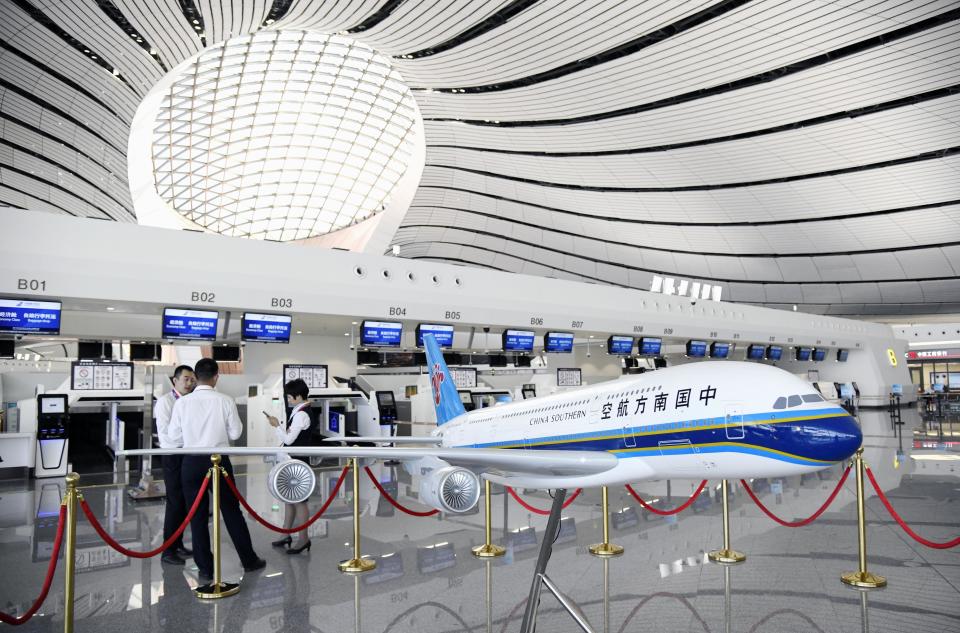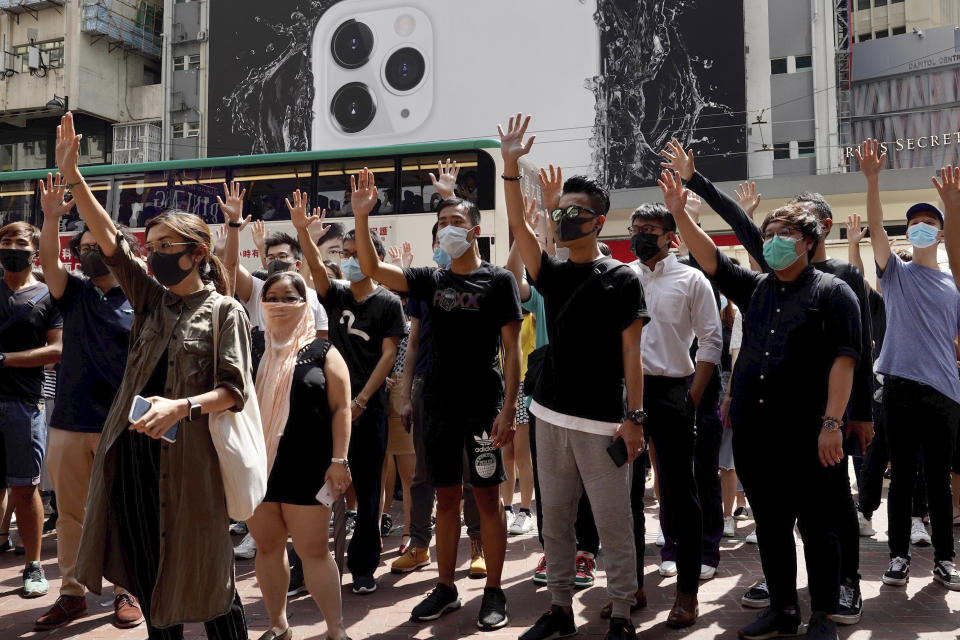Trump impeachment makes America fall behind China
The biggest casualty of the Trump impeachment proceedings is...everything.
Whether you are pro or con—and the nation is apparently split evenly right now—it’s clear that the presidential mess makes it impossible for Washington to focus on much of anything. Which I might add is no reason to drop the investigation. To my mind it merely means, as Congressman Adam Schiff has emphasized, the process should be expeditious.
What this also means, however, is that America is falling behind.
While we argue over whether or not we should rid ourselves of the most unPresidential President in history, our friends, foes and frenemies are racing ahead.
Events this week in China and the Asia Pacific region make that oh-so clear. The biggie of course was China’s massive 70th anniversary parade on Tuesday, with tens of thousands of troops and a plethora of new weaponry on display including new Dongfeng-41 (DF-41) ICBM nuclear missiles that can reach the U.S. in 30 minutes, other missiles that can fly at five times the speed of sound, supersonic drones, and new J-20 stealth fighter jets. Lovely.
This was China’s biggest military display ever and state media reported that 40% of the hardware was on display for the first time. “It’s a military parade that is political shock and awe,” said Richard McGregor, China analyst at the Lowy Institute, a Sydney-based independent think tank. (Oh yeah, and later some scientists, athletes and artists marched too.)
Pentagon analysts must have been riveted watching the footage. Did they have an opportunity to brief President Trump, or was he too busy huddling with Rudy Giuliani or berating reporters?
Still the president can’t have been surprised. It’s almost as if Chinese President Xi Jinping was taking direction from Trump’s speech at the U.N. the week prior. “...take pride in your country,” Trump told the General Assembly. “...love your nation. The future does not belong to globalists. The future belongs to patriots.”
Xi and Trump are very much on the same page there.
It all begs the question: Is there enough bandwidth in the White House to assess and strategize when it comes to China’s ever increasing military prowess?
And you might have missed a few days earlier when Beijing opened its new mega, $17 billion airport, bigger than 98 football fields, featuring the world’s largest terminal which is in the shape of a starfish. Within a few years, Beijing Daxing International Airport will be one of the world’s biggest, (this in addition to Beijing Capital Airport, already a colossus.)
Is there enough bandwidth in Washington right now to undertake large-scale infrastructure projects?

China’s South Pacific ambitions
Who knows how far China’s ambitions extend. Having just come back from the South Pacific I saw firsthand the long arm of Beijing. In Australia, where over 30% of exports go to China, ads in the Sydney Airport welcome and hawk services to Chinese travelers in Mandarin. Ditto for real estate billboards. “What does our country do anymore,” asked Matt Barrie, CEO of Freelancer.com at the Yahoo Finance All Markets Summit in Sydney. “We dig up dirt, iron ore that is, and we send it to China. We dig up coal and we send to China.”
In Fiji, 2,000 miles to the northeast, the papers were celebrating a $30 million jetty project paid for by the Chinese, plus Chinese help for the local sugar industry, plus a new $5 million sports stadium, paid for mostly by, guess who, the Chinese. “Trade flows between Fiji and China have been flourishing in recent years,” Fiji’s Minister for Trade Premila Devi Kumar said recently. Must be. Walking into a tiny dusty rural store on the island of Viti Levu—5,600 miles from Beijing (Los Angeles is 100 miles closer)—you are greeted by an automated recording: “Ni hao!”
So, while China’s aspirations in the South Pacific aren’t spelled out for us, they’re certainly extensive. Unlike our historical rivals, Chinese expansion takes the form of fishing routes, trade delegation visits, loans, port projects and myriad other investments. It’s a kind of Pacific Belt and Road extension to secure resources, filling the vacuum left by the diminished power and footprint of Britain, France and the U.S. Ironically perhaps, in the South Pacific much of this is taking place in the same territory where the Allies fought Japanese military expansionism 75 years ago.
Is there enough bandwidth right now to stay on top of China’s South Pacific ambitions?
Hong Kong and Indonesia protests, Japan’s economic woes
China has its issues of course with Hong Kong at the top of the list. Just this past week, the situation worsened with protesters looking to draw attention from the 70th anniversary celebration. Hong Kong is vexing for Beijing. Xi is boxed in between doing nothing, which is bad, and intervening, which is worse.
“If China handles Hong Kong in a much more aggressive way...it has bearing for Chinese leadership in the world, which is something that President Xi has invested a great deal in,” former U.S. ambassador to the UN, Samantha Power told me recently.
Tweeting support for the protesters, which Hillary Clinton did, is simplistic to the point of being detrimental, but worse is being too distracted to pay close attention, which by default is the Trump doctrine.

The Hong Kong situation calls for serious, nuanced thinking and work. But that’s not this administration. Maybe we can pick it up one or five years hence.
Again, with regard to Hong Kong, do we have enough bandwidth to monitor the situation, take advantage of it perhaps, or even help?
Oh and did you notice what was going on in Indonesia this week? Or Japan? Riots in Indonesia spread across the country as thousands of protesters, mostly students, railed against a new law that would weaken anti-corruption measures. At least three died and several hundred were injured. This is unrelated to a spate of ethnic violence in the Indonesia province of Papua where dozens have been killed over the past two weeks. Complicated stuff.
As for Japan, Shinzo Abe, set to become his country’s longest serving prime minister, (he took office in December of 2012) just raised the nation’s sales tax from 8% to 10% to address Japan’s onerous national debt. It’s a risky bet, as hikes like this can make an economy stall out, particularly one that’s weak to begin with like Japan’s. You think Abe might have phoned up Donald and his people to solicit advice? Maybe not this week.
Do we have any bandwidth to sort through Indonesia’s problems and counsel Japan with its economic issues?
And beyond China, the trade war and Asia Pacific writ large, do we have enough bandwidth to stay on top of the USMCA in this hemisphere and disputes with the Europeans, all of which has resulted in a global trade slowdown, reducing exports and resulting in the lowest read for U.S, manufacturing since June 2009 when we were emerging from the Great Recession?
The answer to the last question and to all my bandwidth questions, is no. The president has put our country in a position where we are at best relegated to governance by Twitterpolitik and now at worst by sheer negligence. The longer all this lasts, the more hay the rest of the world—for better or for worse—makes.
This article was featured in a special Saturday edition of the Morning Brief on October 5, 2019. Get the Morning Brief sent directly to your inbox every Monday to Friday by 6:30 a.m. ET. Subscribe
—
Andy Serwer is editor-in-chief of Yahoo Finance. Follow him on Twitter: @serwer.
Read more:
Facebook's Zuckerberg and Sandberg are this involved with the company's content issues
Negative interest rates are coming and they are downright terrifying
Follow Yahoo Finance on Twitter, Facebook, Instagram, Flipboard, SmartNews, LinkedIn, YouTube, and reddit.


